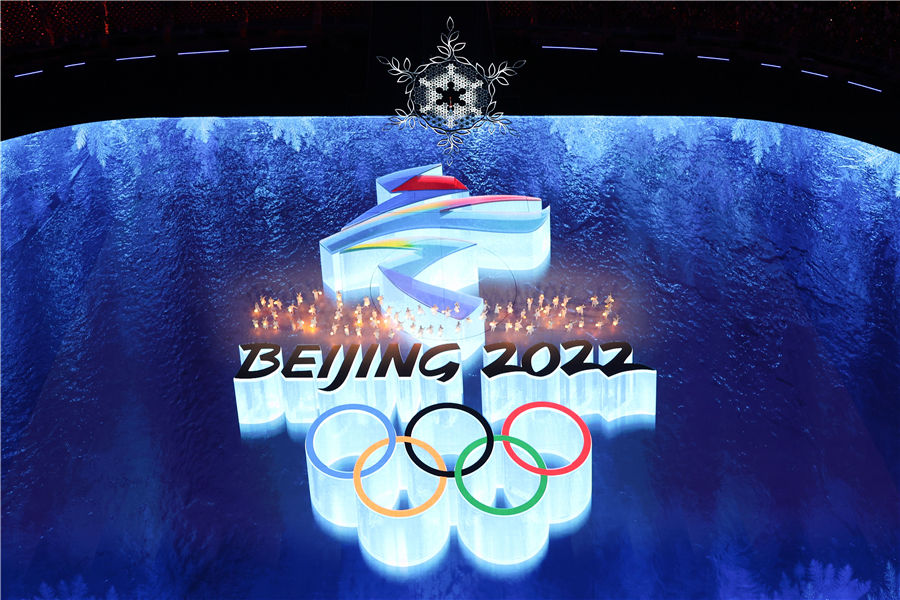Winter Games display a more confident China


From realizing the dream of hosting the Summer Olympics in 2008 to reuniting with the Olympic movement in 2022, it took less than 14 years for Beijing to become the first city to host both the Summer and Winter Olympic Games, which concluded on Sunday. This unprecedented feat is reflective of the new Olympic motto of "Faster, Higher, Stronger-Together".
After the 2008 Summer Olympics, China made concerted efforts to become a major sports power and popularize sports, in order to help the Chinese people improve their physical health. And after winning the bid to host the Winter Games, China took targeted measures to popularize winter sports, including in the southern part of the country, while promoting the vigorous and sustainable development of mass sports.
In the six years between winning the bid and hosting the Winter Games, not only did the coverage of winter sports in China expand but also public participation in ice and snow games grew significantly. While the growing popularity of winter sports has helped improve many people's livelihoods, a growing number of Chinese people have found new ways to maintain their physical fitness.
Today, more than 300 million Chinese are engaged in winter sports, skiing at about 2,000 ski resorts and/or skating and playing other winter sports in ice-skating rinks, thus propelling China on the way to becoming a sports powerhouse and injecting new vitality into the lives of more than 1.4 billion Chinese people.
China has held a successful Winter Olympics amid the COVID-19 pandemic, because it has been pursuing higher-quality development in the new era. From holding a "Blue Olympics" in 2008 to the first carbon-neutral Winter Olympic in history, China has been making great efforts to build an ecological civilization.
As the "City of Two Olympics", Beijing, thanks to its green and low-carbon development policy, reflects China's efforts to realize a green transformation of the economy. By turning the "Water Cube" (National Aquatics Center) into the "Ice Cube" and other Summer Games' venues into Winter Olympics' venues, and building the world's first permanent Games venue at a former urban industrial site, China has exhibited its sustainable development practices to the world, met the people's need for an ecological environment and gathered vital experience to help improve global ecological governance.
The return of the Olympics to Beijing after 14 years has allowed the world to see a China that is more confident of its culture and traditions. From showcasing the glorious Chinese civilization in 2008 to snowflakes lighting up the world at the 2022 Winter Games opening ceremony, China has presented the grand narrative through a poetic expression of "Together for a shared future".
The philosophy, the profound value and the spirit of Chinese culture remains unchanged. What have changed, in fact, gained in strength, are China's confidence, level-headedness and humanitarianism, and its cultural inclusiveness and innovation capacity which reflect the Olympic spirit.
From "one world, one dream" to "together for a shared future", China has been promoting the development of the Olympic Games, and helping the world unite through sports.
The Beijing Winter Olympics is the first international sports event to be held on schedule since the pandemic broke out in early 2020. And in more ways than one, the pandemic has made people across the world realize that humankind has a shared destiny.
The Olympic Games teach us that differences in cultures, countries and peoples not only can be overcome but also can be capitalized and built upon to inspire and propel the human race forward.
Through the Winter Olympics, China has shown that it is committed to upholding the Olympic spirit of inclusiveness and making unremitting efforts to help humankind overcome the myriad challenges facing the world. And by hosting a simple, safe and splendid Winter Olympics, China has demonstrated that it has the courage, strength and tenacity in realizing national rejuvenation.
The author is a professor at the Shanghai University of Sport. The views don't necessarily reflect those of China Daily.
If you have specific expertise or would like to share your thoughts, then send your writings to [email protected] and [email protected].
































